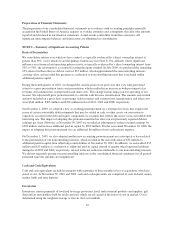Carnival Cruises 2010 Annual Report Download - page 21
Download and view the complete annual report
Please find page 21 of the 2010 Carnival Cruises annual report below. You can navigate through the pages in the report by either clicking on the pages listed below, or by using the keyword search tool below to find specific information within the annual report.In the event that Carnival Corporation were to default on its contingent obligations and assuming performance by
all other participants, we estimate that we would, as of November 30, 2010, be responsible for a termination
payment of approximately $106 million. In 2017, we have the right to exercise options that would terminate
these two LILO transactions at no cost to us.
In certain cases, if the credit ratings of the financial institutions who are directly paying the contingent
obligations fall below AA-, then Carnival Corporation will be required to replace these financial institutions with
other financial institutions whose credit ratings are at least AA or meet other specified credit requirements. In
such circumstances we would incur additional costs, although we estimate that they would be immaterial to our
financial statements. All of the financial institution payment undertakers subject to this AA- credit rating
threshold have credit ratings of AAA. If Carnival Corporation’s credit rating, which is BBB+, falls below BBB, it
will be required to provide a standby letter of credit for $63 million, or, alternatively, provide mortgages for this
aggregate amount on these two ships.
As a result of the unwinding of our third LILO transaction, we recorded a $15 million gain in other nonoperating
income in fiscal 2009, which had originally been deferred at the inception of the LILO transaction and was being
amortized over its term.
Contingent Obligations – Indemnifications
Some of the debt agreements that we enter into include indemnification provisions that obligate us to make
payments to the counterparty if certain events occur. These contingencies generally relate to changes in taxes and
changes in laws that increase lender capital costs and other similar costs. The indemnification clauses are often
standard contractual terms and were entered into in the normal course of business. There are no stated or notional
amounts included in the indemnification clauses, and we are not able to estimate the maximum potential amount
of future payments, if any, under these indemnification clauses. We have not been required to make any material
payments under such indemnification clauses in the past and, under current circumstances, we do not believe a
request for material future indemnification payments is probable.
NOTE 8 – Income and Other Taxes
We are primarily foreign corporations engaged in the business of operating passenger vessels in international
transportation. Generally, income from, or incidental to, the international operation of vessels is subject to
preferential tax regimes in the countries where the vessel owning and operating companies are incorporated, and
generally exempt from income tax in other countries where the vessels call due to the application of income tax
treaties or domestic law which, in the U.S., is Section 883 of the Internal Revenue Code. Income that we earn
which is not associated with the international operation of ships or earned in countries without preferential tax
regimes may be subject to income tax in the countries where such income is earned.
AIDA, Costa, Cunard, Ibero, P&O Cruises (UK) and P&O Cruises (Australia) are subject to income tax under
the tonnage tax regimes of either Italy or the United Kingdom. Under both tonnage tax regimes, shipping profits,
as defined under the applicable law, are subject to corporation tax by reference to the net tonnage of qualifying
vessels. Income not considered to be shipping profits under tonnage tax rules is taxable under either the Italian
tax regime applicable to Italian registered ships or the normal UK income tax rules. Ibero is also subject to a
preferential Portuguese income tax applicable to international shipping operations. We believe that substantially
all of the ordinary income attributable to these brands constitutes shipping profits and, accordingly, Italian,
Portuguese and UK income tax expenses for these operations have been minimal under the existing tax regimes.
In fiscal 2010, AIDA and Costa recognized a $30 million income tax benefit from an Italian investment incentive
related to certain of their newbuild expenditures.
Carnival Cruise Lines, Princess, Holland America Line and Seabourn are primarily subject to the income tax
laws of Panama, Bermuda, Curacao and Bermuda, respectively. As a general matter, the laws of Panama and
20
























